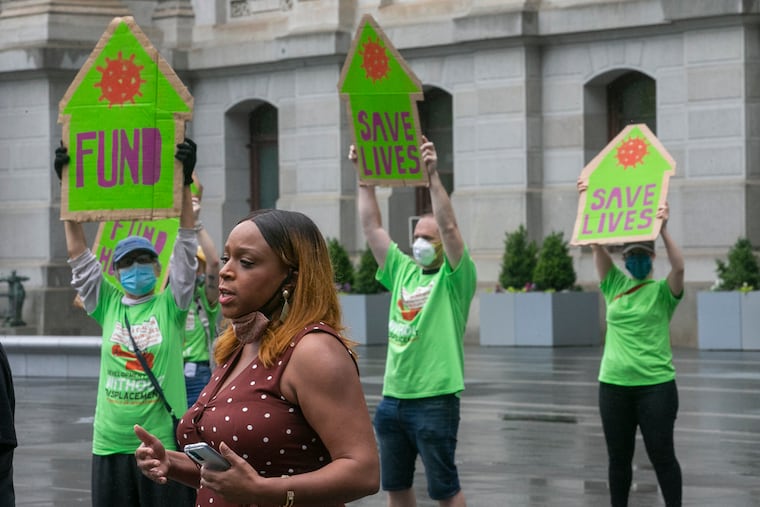How City Council’s budget vote will help keep Philadelphians housed
City Council restored millions of dollars in housing funding that the city had proposed to cut to fill a budget hole the pandemic will cause.

For months, tenants, advocates, and city officials have repeatedly asked the city to do all it can to prevent Philadelphians from becoming homeless en masse during the pandemic, a time when the city has asked residents to stay in their homes to slow the spread of the coronavirus.
With Philadelphia facing a roughly $749 million revenue shortfall because of the pandemic in the fiscal year that starts Wednesday, July 1, Mayor Jim Kenney proposed cuts to the city’s budget. Among those cuts was funding for various housing initiatives, including the development of low-income housing, eviction prevention, and financial assistance for first-time home buyers.
City residents have been calling for cuts in the city’s police budget and echoing nationwide calls to spend more on social services, including housing. Last week, City Council restored some of the funding for housing, the arts, and adult education in the revised budget, which councilmembers approved Thursday.
“The mass protests we’ve seen over the past few weeks have really changed the political weather and put a big spotlight on how the city is spending money,” said Emma Boorboor, organizing director at the Women’s Community Revitalization Project, which develops and advocates for low-income housing.
The organization is a member of the Philadelphia Coalition for Affordable Communities, which organized a May 28 protest outside City Hall to demand housing funding.
Much of the restored funding to keep Philadelphians housed involves an eviction prevention program and a housing fund that advocates argued are essential. Here’s where that money goes.
Philadelphia Eviction Prevention Project
The Philadelphia Eviction Prevention Project, a collaboration of six service providers that the city created in 2018, provides legal representation, financial counseling, and other resources to tenants facing eviction. The project was facing up to a 75% cut to its $2.1 million budget, but it got to keep all of its funding.
» READ MORE: Advocates, officials try to prevent Philly’s coming wave of coronavirus evictions
The program provides information to tenants and unrepresented landlords and grew out of a mayoral task force on eviction prevention. Visits to the project’s website, phillytenant.org, “have skyrocketed since the pandemic,” said Rachel Garland, managing attorney in the housing unit at Community Legal Services. Many struggling tenants haven’t received unemployment benefits and some haven’t received stimulus checks, she said.
People facing evictions are overwhelmingly Black and women with children. Tenants assisted by the project are more likely to win their eviction cases.
Last week, City Council unanimously voted to pass a bill that would create an eviction diversion program, which would require tenants and landlords to go through mediation before landlords seek eviction in court. Garland said the diversion program will complement the work of the Philadelphia Eviction Prevention Project.
» READ MORE: City Council passes housing bills to help Philly renters during the pandemic
The Housing Trust Fund
The Housing Trust Fund helps create low-income housing and homes adapted for people with special needs and provides rent subsidies and mortgage assistance.
The budget restores the $20 million annual contribution to the Housing Trust Fund the mayor had promised as part of a five-year plan to infuse the fund with $100 million. In response to the pandemic, Kenney had proposed cutting city contributions and relying on federal funds. The fund gets some of its money from deed recording fees, revenue the city projects will decrease because of the pandemic.
Proposed cuts included funds for home repairs and modifications, the rehabilitation of existing rental homes and the development of new ones, and assistance for first-time home buyers.
» READ MORE: Tenants and landlords in Pa. and N.J. are seeking rental assistance to fend off evictions
Even with federal money, the fund “is only going to scratch the surface” of the need, especially since many people are struggling during the pandemic, said Beth McConnell, policy director at the Philadelphia Association of Community Development Corporations. As one example, she pointed to the city’s pandemic rental assistance program, for which almost 13,000 people applied and 4,000 will receive help.
“We are so grateful our champions in City Council pushed back and fought to keep those Housing Trust Fund dollars in the budget,” McConnell said.
Boorboor called the current moment “a perfect political storm to then get the pressure that we needed to get City Council and the mayor to restore the funding to the Housing Trust Fund.”
» READ MORE: 13,000 Philadelphians applied for pandemic rental assistance. Funds ran out after 4,000.
The fund serves people who already were struggling to meet their needs, including households with the lowest incomes, people with disabilities, and seniors, she said. The Women’s Community Revitalization Project, which gets funding from the city and distributes rent subsidies, owns roughly 300 rental units for tenants whose average income is less than $15,000 a year, she said.
She noted that many people who live in nursing homes, places hit hardest by the coronavirus, do so because they lack affordable, accessible housing options.
“When being housed at this moment is a matter of life and death,” Boorboor said, “it’s not the time to cut housing funds.”